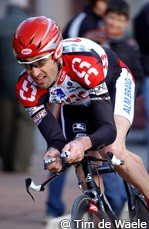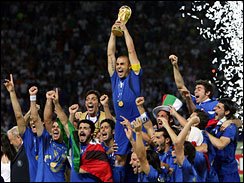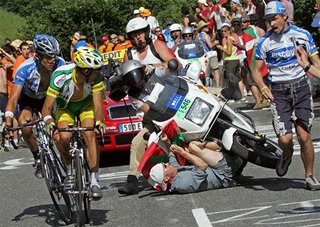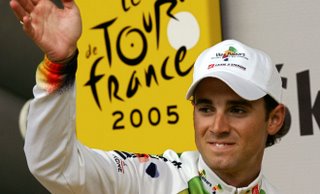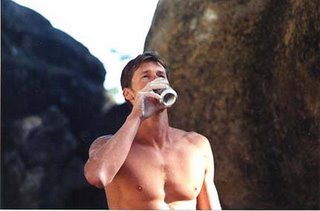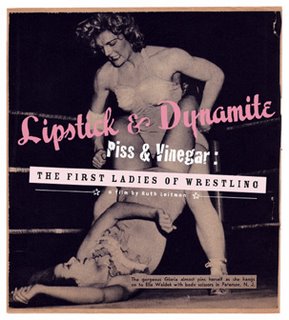Nutrition 911, Part VI: The Worst Food on the Planet
By Steve Edwards
Welcome to Part VI of our oh-so-basic nutrition class designed to give
you an overview of basic nutrition and make healthy eating much
simpler. In Part I, we addressed the terms organic, grass-fed,
free-range, and farm-raised. Part II analyzed the ever-popular
"fat-free" and trendy "low-carb" slogans. In Part III, we took the CliffsNotes approach to reading food labels. Part IV tackled
dessert.
Last time (
Part V), we discussed what you should eat. This time, let's
talk about what you shouldn't eat. Actually, I mean drink; leading to
our first lesson of the day. Calories are calories, whether you eat them
or drink them. And just what are the worst calories you can consume?
The answer is soda pop. Forget about brands; whether it's Coke, Barq's Root Beer, or Dr. Pepper, it's all junk. The taste might make you happy,
but from a nutritional point of view, soda's only place in the world is
to make people fat, sick, and unhappy.
Alarming statistics
In America, we drink a lot of cola (or "un-cola"). A lot. On average we
each drank 52.4 gallons in 2005, and this figure includes infants,
healthy folks, prisoners, etc., meaning that the average soda drinker actually gulps (their word) more than this. Carbonated soft drinks
are the biggest single caloric source in the American diet. Teenagers,
in particular, are hooked on the stuff and get an average of 13 percent
of their daily calories from "pop." If this doesn't scare you, it should.
In terms of sheer amount, these statistics could be alarming if it were
any one food. A proper diet should have some balance and diversity.
And soda pop is the antithesis of "any food." It's bad food.
"Empty calories"
We use the term "empty calories" for foods, like soda, that have no
place in a nutritious diet. I feel this term is misleading. The calories
in soda are far from empty. Most of them come from sugar. In the USA,
it's nearly always high-fructose corn syrup, the cheapest, most
processed sugar on the market. Other ingredients include caffeine,
various phosphates and acids, and artificial colorings. We'll get to
their effects on the human body in a minute, but first, let's stick to
the simple stuff. The average teenager consumes between 10 and 15 teaspoons per day of refined sugar via soda—about their daily
requirement, according to government standards, for all foods.
This means, that for the average teenager, their soda consumption
virtually eliminates their chances of eating a balanced diet. There's nothing empty about that.
Weird science
The soda companies are a marketing juggernaut. They spend roughly
$700 million a year on media advertising alone. Not to mention
hundreds of millions more sponsoring events, athletes, musicians,
and such. This volume of cash makes it difficult for consumers to
avoid them, by design. To avoid the temptation to drink Coke, you've
got to be highly principled or living in the middle of the jungle. And
even then, well, I once happened upon a soda vending machine
halfway up Mount Yarigatake in the Japanese Alps and a friend
traveling in Guatemala found Coke in a rural area that didn't have
running water. Let's just say, they're going to continue to make it
easy for you to find the stuff.
This type of marketing machine won't go away quietly. With the
stats above, you could certainly put two and two together and link
soda companies to the childhood (and adult) obesity epidemic that is arguably the world's most serious health crisis. Yet, while researching
this article I came across a widely published "study" stating that "soft drink consumption has no effect on childhood obesity." Suspicious
from the get-go (the word "no" being a huge red flag), it didn't take me
long to find this statement: "The research paper was supported by an unrestricted gift from the American Beverage Association." Bingo. Remember those Phillip Morris tobacco "studies" that promised a
long and healthy life from chain smoking?
What makes it so bad?
Besides the simple caloric trade-off, sodas are formulated to give you
a rush. The sugar is mixed with phosphates designed to speed it into
your system. It's so good, in fact, that many cyclists prefer Coca-Cola
to specific sports food when they need a sugar rush near the end of
races. And, while a sugar rush is a good thing when you're trying to
exceed your anaerobic threshold and are out of blood glycogen (never mind, if you don't know what this is), it's a bad thing whenever you're
not, which is even a competitive cyclist's state of being 99 percent of
the time.
Beyond the simple sugar rush, these acids and phosphates alter your
body's pH levels and inhibit absorption of other nutrients. Then there
are the effects of certain artificial coloring agents. For example,
yellow #5, commonly used in soft drinks, has been linked to
attention deficit disorder, hives, asthma, and other allergic reactions
in some children.
Then there is the nutrient trade-off to consider. A person who drinks
a Big Gulp per day must go to great lengths to maintain a balanced
diet. Otherwise they will almost certainly be deficient in numerous vitamins, minerals, dietary fiber, and essential fatty or amino
acids—none of which are found in soda. For this reason, soda is
often linked to type 2 diabetes, osteoporosis, dental erosion, and a
higher risk of kidney stones and heart disease. And that's just a start. There's plenty of less scientific data linking soda to
poor scholastic habits.
Diet sodas and juicesIn an attempt to become thought of as healthier,
soda companies have diversified into non-carbonated beverages and
diet sodas. While these are an improvement in some ways, they are
hardly a solution to the problem.
First off, most juices and other caloric non-soda alternatives are
mainly just sugar and water without the carbonation. A quick label comparison between a commercial orange juice and a Mountain Dew would show a similar "bottom line" with regards to calories and sugar.
The only improvement would be the lack of the non-caloric offenders.
But that's no small matter, as the true effects of these ingredients
have not been thoroughly studied. Despite their no-calorie status,
diet sodas have been linked to assorted illnesses. There is no good
science on this yet but my own anecdotal evidence is, so far, 100% accurate. I've yet to have a client not lose weight by kicking diet soda. Granted, all of my clients drank an excessive amount, but regardless,
there is little doubt that the pH balance of diet sodas hinders the
body's ability to absorb nutrients. One client, a female athlete, lost
15 pounds by making no other dietary change but eliminating diet
soda. Fifteen pounds and zero calories—more weird science. The
bottom line to all this is that, for best results, your body would be
happier if you cut most of the calories out of your liquids and cut
out soft drinks—caloric or not—altogether.
How can you help?
In my world, soft drinks would come with the same type of regulatory language as cigarettes and booze, at least. Actually, in my world we'd
all be educated and wouldn't require this language at all, but that's
politics 911, not nutrition 911. Anyway, here are five ways you can help educate the public about the dangers of soda, according to the Center
for Science in the Public Interest (CSPI). Contact your local
government officials and/or the Food and Drug Administration
(FDA) and suggest that:
National and local governments should require chain restaurants to declare the calorie content of soft drinks and all other items on
menus and menu boards.
The FDA should require labels on non-diet soft drinks to state that frequent consumption of those drinks promotes obesity, diabetes,
tooth decay, osteoporosis, and other health problems.
Local, state, and federal governments should provide water fountains
in schools, government buildings, parks, and other public spaces.
School systems and other organizations catering to children should
stop selling soft drinks (as well as candy and other junk foods) in hallways, shops, and cafeterias.
State and local governments should consider levying small taxes
on soft drinks, with the revenues earmarked for promoting health
and fitness. A national 2-cent tax on a can of soda pop would raise
$3 billion annually.




